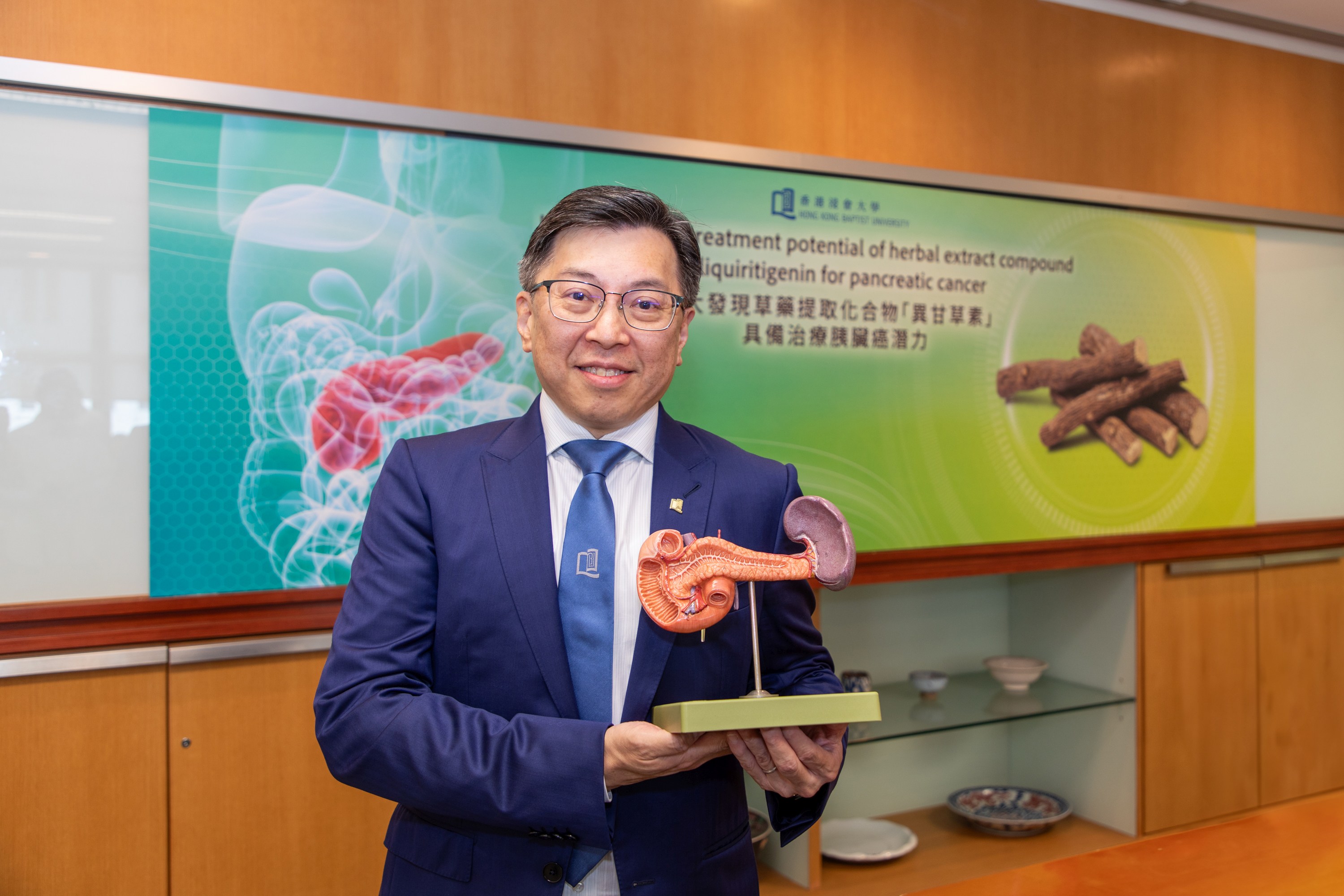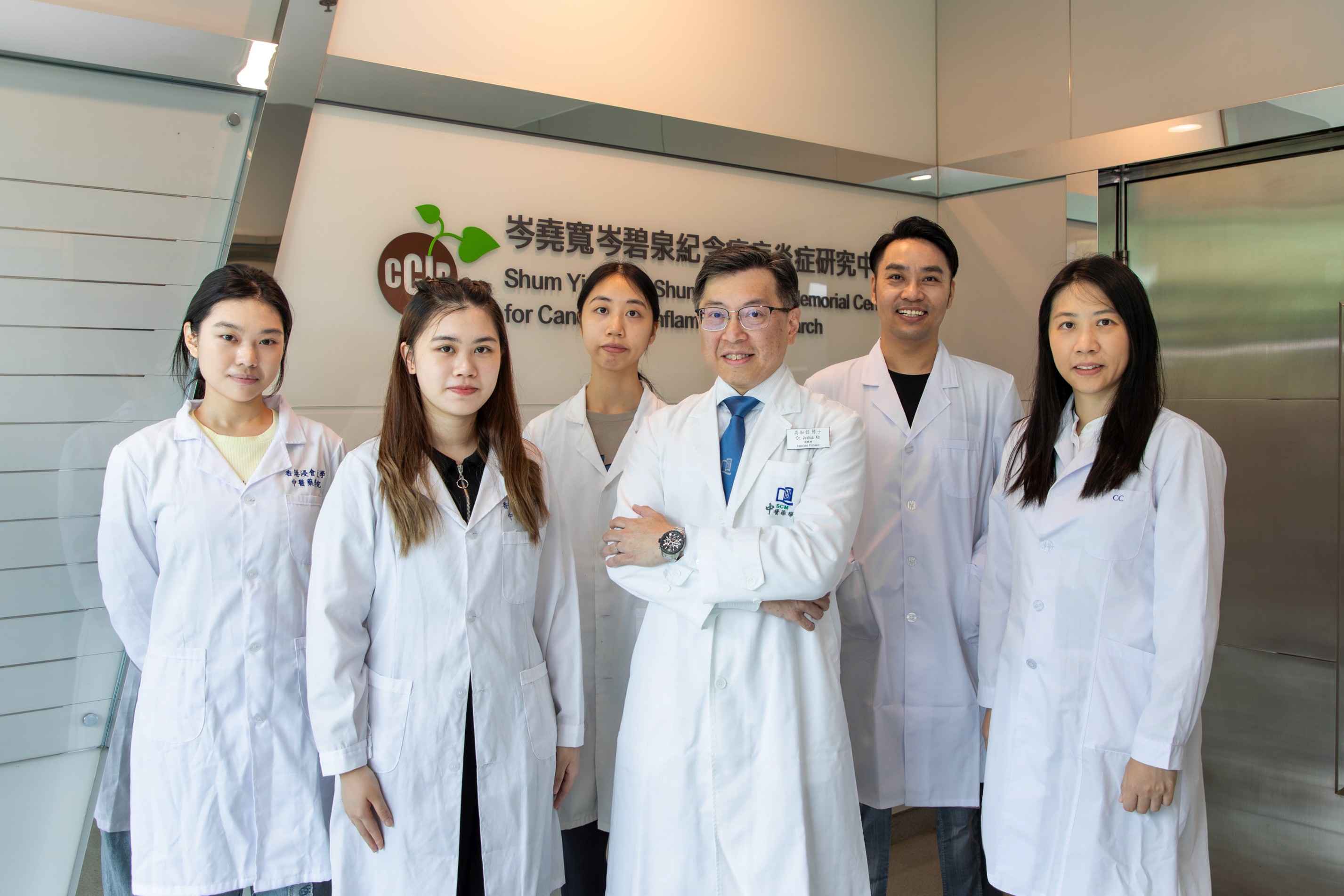News
Scientific Discovery: SCM research team unveils treatment potential of isoliquiritigenin for pancreatic cancer
7 August 2023
A research led by Dr. Joshua Ko Ka-Shun, Associate Professor of Teaching and Research Division (CMTR), found that isoliquiritigenin (ISL), a flavonoid isolated from the Chinese herbal medicine licorice, can inhibit pancreatic cancer progression and may enhance the efficacy of conventional chemotherapeutic drugs in treating pancreatic cancer. It is the first time that a research group reported the anticancer potential of ISL in treating pancreatic cancer. The research findings have been published in the international academic journal Phytomedicine and recently presented in the Annual Congress of the European Association for Cancer Research 2023 in Torino, Italy.
About Pancreatic cancer
Pancreatic cancer is the fourth leading cause of cancer deaths in Hong Kong, which is often called the “silent killer” as most patients experience little or no symptoms until it has advanced and spread. According to the Global Cancer Statistics 2020 released by the International Agency for Research on Cancer, the mortality-to-incidence ratio of pancreatic cancer is greater than 93%. The treatment of pancreatic cancer primarily consists of surgery and chemotherapeutic drugs. However, only 20% of patients are suitable for resection and the recurrence rate is high. In non-resectable cases and metastatic pancreatic cancer patients, the chemotherapeutic drug gemcitabine (GEM) remains the mainstream treatment. Nevertheless, GEM-based combination therapy exhibits profound chemoresistance with serious systemic toxicity.
ISL inhibits cancer progression with fewer side effects
In the search for alternative treatments for pancreatic cancer, the research team screened all the potential pancreatic cancer disease markers and the biological therapeutic activities of phytochemicals from the medicinal plant Glycyrrhiza glabra (licorice, or Gancao in Chinese) using network pharmacology, identifying ISL as a potential anticancer agent for the treatment of pancreatic cancer. With a series of cell experiments, the team demonstrated that ISL suppressed the growth and induced apoptosis (programmed cell death) of pancreatic cancer cells.
“ISL possesses a unique property of inhibiting pancreatic cancer progression through the blockade of autophagy, which is a natural process where the body’s cells clean out damaged or unnecessary components. The blockade of late-stage autophagy in our experiments results in cancer cell death,” said Dr Ko.
The research team further employed a mice tumor model to investigate the efficacy of ISL in inhibiting pancreatic cancer cell growth in vivo. The results showed that ISL demonstrated treatment effects comparable to that of GEM and showed fewer side effects in mice compared with GEM.
Enhances effects of chemotherapies
Current first-line chemotherapeutic drugs for pancreatic cancer, such as GEM and 5-fluorouracil (5-FU), induce autophagy which favours the growth of cancer cells and causes chemoresistance, and thus jeopardises their treatment effects. To explore ISL’s potential in counteracting the chemoresistance of GEM and 5-FU, the research team set up experiments with pancreatic cancer cells treated with GEM or 5-FU together with ISL. The results showed that ISL can enhance the treatment effects of chemotherapeutic drugs by blocking autophagy, which is conducive to the death of cancer cells.
“The findings in this study open a new avenue for developing ISL as a novel autophagy inhibitor in the treatment of pancreatic cancer. We hope to collaborate with other research partners to further evaluate the effectiveness and potential clinical application of ISL in treating pancreatic cancer,” said Dr Ko.
To learn more about this scientific discovery, please click here for the full press release.


A research team led by Dr. Joshua Ko found that isoliquiritigenin, a herbal extract compound of the Chinese herbal medicine licorice, can inhibit pancreatic cancer progression.


Dr Joshua Ko and his research team members reported the anticancer potential of isoliquiritigenin in treating pancreatic cancer for the first time.